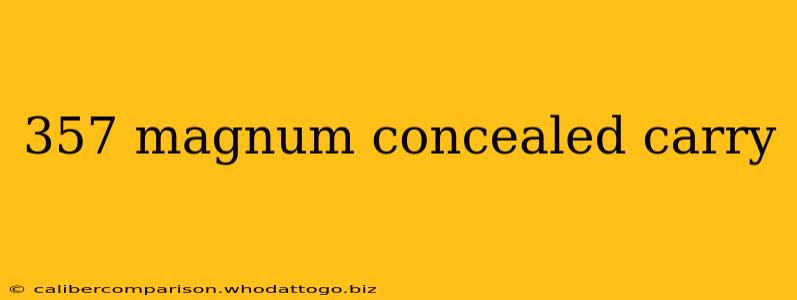The .357 Magnum is a potent cartridge, renowned for its stopping power. Its popularity extends to concealed carry, although it presents a unique set of challenges and considerations. This guide delves into the realities of carrying a .357 Magnum for self-defense, weighing its advantages and disadvantages to help you make an informed decision.
The Allure of the .357 Magnum for Concealed Carry
The .357 Magnum's appeal for concealed carry stems primarily from its impressive stopping power. Its larger projectile and higher velocity deliver significantly more energy upon impact than smaller calibers like 9mm or .45 ACP. This translates to a higher likelihood of stopping a threat quickly and effectively. For individuals prioritizing maximum stopping power in a compact package, the .357 Magnum remains a compelling option.
Advantages of .357 Magnum Concealed Carry:
- Stopping Power: This is the undeniable king. The .357 Magnum's energy transfer is superior to many other handgun calibers, potentially leading to faster threat neutralization.
- Versatility: The ability to fire both .38 Special and .357 Magnum rounds offers flexibility. .38 Special ammunition provides a less-recoil option for practice and everyday carry, while .357 Magnum rounds are reserved for situations demanding maximum stopping power.
- Availability: Ammunition for the .357 Magnum is widely available, although prices can fluctuate.
The Challenges of Concealed Carry with a .357 Magnum
While the .357 Magnum offers significant advantages, several drawbacks must be carefully considered before opting for concealed carry with this cartridge.
Disadvantages of .357 Magnum Concealed Carry:
- Recoil: This is the most significant drawback. The substantial recoil of the .357 Magnum can be challenging to manage, especially for individuals with less experience or smaller builds. Strong recoil can hinder rapid follow-up shots, crucial in a self-defense scenario.
- Size and Weight: .357 Magnum revolvers tend to be larger and heavier than comparable handguns in smaller calibers. This can make comfortable and discreet concealed carry more difficult, especially during warmer months.
- Carry Comfort: The heavier weight and potentially larger size can lead to discomfort during extended periods of carry.
- Muzzle Blast: The significant muzzle blast associated with the .357 Magnum can be a safety concern, especially in close-quarters environments.
Choosing the Right Firearm and Ammunition
Selecting the appropriate firearm and ammunition is paramount for safe and effective .357 Magnum concealed carry.
Factors to Consider:
- Revolver vs. Semi-automatic: While .357 Magnum semi-automatics exist, revolvers are generally preferred for concealed carry due to their reliability and simplicity.
- Barrel Length: Shorter barrels reduce the overall size of the firearm, but they also reduce velocity and accuracy.
- Ammunition Selection: Consider a balance between stopping power and manageable recoil. .38 Special rounds offer a less-recoil training option, while carefully chosen .357 Magnum loads are suitable for defense.
Conclusion: Is .357 Magnum Concealed Carry Right for You?
The decision to carry a .357 Magnum concealed rests on a careful assessment of your individual circumstances and capabilities. While its stopping power is undeniable, the substantial recoil and larger size present significant challenges. Honest self-assessment of your shooting skills, physical capabilities, and concealed carry comfort level is crucial before choosing this powerful cartridge for self-defense. Consider seeking professional training from a qualified firearms instructor to ensure you're proficient and comfortable with handling a .357 Magnum before carrying it for concealed self-defense. Always prioritize safety and responsible firearm ownership.

